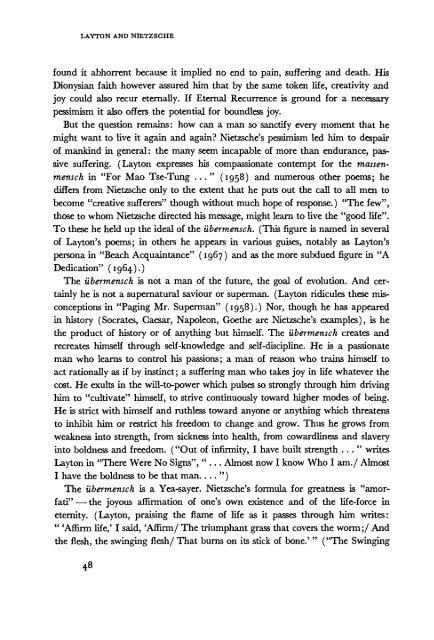LAYTON AND NIETZSCHE
LAYTON AND NIETZSCHE
LAYTON AND NIETZSCHE
Create successful ePaper yourself
Turn your PDF publications into a flip-book with our unique Google optimized e-Paper software.
<strong>LAYTON</strong> <strong>AND</strong> <strong>NIETZSCHE</strong><br />
found it abhorrent because it implied no end to pain, suffering and death. His<br />
Dionysian faith however assured him that by the same token life, creativity and<br />
joy could also recur eternally. If Eternal Recurrence is ground for a necessary<br />
pessimism it also offers the potential for boundless joy.<br />
But the question remains: how can a man so sanctify every moment that he<br />
might want to live it again and again? Nietzsche's pessimism led him to despair<br />
of mankind in general : the many seem incapable of more than endurance, passive<br />
suffering. (Layton expresses his compassionate contempt for the massenmensch<br />
in "For Mao Tse-Tung ..." (1958) and numerous other poems; he<br />
differs from Nietzsche only to the extent that he puts out the call to all men to<br />
become "creative sufferers" though without much hope of response.) "The few",<br />
those to whom Nietzsche directed his message, might learn to live the "good life".<br />
To these he held up the ideal of the Übermensch. (This figure is named in several<br />
of Layton's poems; in others he appears in various guises, notably as Layton's<br />
persona in "Beach Acquaintance" ( 1967) and as the more subdued figure in "A<br />
Dedication" ( 1964 ). )<br />
The Übermensch is not a man of the future, the goal of evolution. And certainly<br />
he is not a supernatural saviour or superman. (Layton ridicules these misconceptions<br />
in "Paging Mr. Superman" (1958).) Nor, though he has appeared<br />
in history (Socrates, Caesar, Napoleon, Goethe are Nietzsche's examples), is he<br />
the product of history or of anything but himself. The Übermensch creates and<br />
recreates himself through self-knowledge and self-discipline. He is a passionate<br />
man who learns to control his passions; a man of reason who trains himself to<br />
act rationally as if by instinct ; a suffering man who takes joy in life whatever the<br />
cost. He exults in the will-to-power which pukes so strongly through him driving<br />
him to "cultivate" himself, to strive continuously toward higher modes of being.<br />
He is strict with himself and ruthless toward anyone or anything which threatens<br />
to inhibit him or restrict his freedom to change and grow. Thus he grows from<br />
weakness into strength, from sickness into health, from cowardliness and slavery<br />
into boldness and freedom. ("Out of infirmity, I have built strength ..." writes<br />
Layton in "There Were No Signs", "... Almost now I know Who I am./ Almost<br />
I have the boldness to be that man ")<br />
The Übermensch is a Yea-sayer. Nietzsche's formula for greatness is "amorfati"<br />
— the joyous affirmation of one's own existence and of the life-force in<br />
eternity. (Layton, praising the flame of life as it passes through him writes:<br />
" 'Affirm life,' I said, 'Affirm/ The triumphant grass that covers the worm;/ And<br />
the flesh, the swinging flesh/ That burns on its stick of bone.' " ("The Swinging<br />
48

















